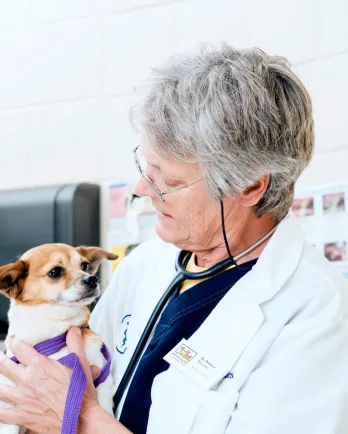Helping Seniors Care for Their Senior Dogs by Sean Hawkins
We all want to grow old with our canine friends by our side, but some senior citizens find themselves no longer able to afford care for their dogs, especially their older dogs. They face the terrible prospect of either giving their dogs up to shelters, or not giving their faithful companions the care they need. In this post, Sean Hawkins of Pet Alliance of Greater Orlando explains how his organization is using a grant from The Grey Muzzle Organization to help seniors provide their older dogs with food and veterinary care, and thus keep vulnerable pets out of shelters.
Almost 10,000 homeless dogs and cats will turn to the Pet Alliance of Greater Orlando for refuge and safety this year. Many of these animals are older pets whose families simply do not have the resources to care for them. Sadly, when a human family falls on hard times, even longtime canine or feline companions are viewed as luxuries, and the animals are often relinquished to an animal shelter out of sheer desperation. Our two animal shelters are filled with haunting faces; Princess, an 11-year-old Daschaund, Hermes, an 8-year-old Pit Bull mix, and Charlie, a 12-year-old Labrador, just to name a few older dogs who have passed through our doors recently.
Even a well-thought-of animal shelter is a terrifying place for an older pet. Unusual surroundings, new smells, frightening sounds, strange people, cold concrete floors, and no familiar toys make any animal shelter a scary place for a dog or cat. Kind staff, helpful volunteers, nourishing food, and the opportunity for exercise do not replace the comforts of home.
For those unfortunate older pets who do end up in animal shelters, it is incredibly difficult to find new homes for them. Sometimes, due to untreatable medical conditions or behavior that deteriorates rapidly in a shelter environment, these pets never do find a new family.
An emerging trend in animal sheltering is to devote resources to keeping animals who have homes in those homes, and preventing them for entering the already overburdened shelter system. Not only are relinquishment intervention strategies better for pets, preventing them from becoming homeless, but keeping a pet in a loving home is often less costly to the community than supporting expanding animal shelter operations.
Enter The Grey Muzzle Organization and the Pet Alliance’s Pet Food Pantry program. At the Pet Alliance of Greater Orlando, we believe that keeping older pets healthy and in their homes is best for them. Keeping these pets in their homes often also helps the human seniors in their family, who benefit from the loyal companionship and comfort that dogs and cats bring to an elderly person who is often alone.
Since 2000, the Pet Alliance has partnered with Seniors First, Osceola County Council on Aging, and Meals on Wheels to identify income-qualified families with pets. Through our Pet Food Panty program, we provide nourishing meals to older animals living with homebound elderly families in Orange, Seminole, and Osceola counties. The pet food is donated to the Pet Alliance by the community and we redistribute the food to animals in the needy families. Once a month, free of charge, volunteers deliver dog and cat food that has been packaged by our staff and volunteers to the families for their pets. All of these seniors are on a fixed income. Through this program, the seniors are able to keep their dogs and cats in their homes while providing them with proper nutrition.
Thanks to a new partnership with The Grey Muzzle Organization, which is dedicated to the well-being of senior dogs, Pet Alliance is able to provide needed veterinary care to senior dogs in the families of senior citizens served through the Pet Food Pantry program. Spaying or neutering, heartworm testing and prevention, vaccinations, and flea prevention are all provided free of charge for Pet Food Panty clients through the Pet Alliance’s two veterinary clinics in Orlando and Sanford.
If additional veterinary care is required, such as treating eye or ear infections or skin allergies, even non-emergency surgeries, the highly skilled veterinarians and trained support staff at Pet Alliance are able to help. Our goal with the Pet Food Pantry program, and now the expanded medical care for pets in these senior families, is to keep these animals healthy and in their homes, safe, where they belong.
Currently 140 dogs and 208 cats are enrolled in the Pet Food Pantry program. That’s over 300 pets who will be able to stay in their homes and out of the animal shelter, thanks to community support and funding from The Grey Muzzle Organization. In many instances, these beloved animals have become the sole companions of many of our community’s human senior citizens.
Rita Musick, a longtime Pet Food Pantry volunteer, says that the program’s impact goes far deeper than simple food delivery. “When we look into the faces of our seniors, we’re looking at our own futures. I maintain regular contact with my seniors, visit them, check on their cats and leave the food with a promise that I will see them again in a few weeks. I hope that someone will be willing to do that for me if there’s ever a need. The program has taken me into neighborhoods that I would not normally visit and has definitely made me more empathetic to the needs of the elderly.”
Jim Westbrook, an elderly Pet Food Pantry client, agrees with Ms. Musick’s experience of the program. “The Pet Food Pantry offers another layer of protection for us. Each month, our volunteer not only brings food for our [pets], but also checks on us to make sure everything is okay.”
Because of the volunteer involvement and the client feedback, we know the Pet Food Pantry program is an important service. Knowing that the older pets in senior families are healthy and in safe homes, we know the program works.
This article was first published in Animals Matter.
For information about Pet Alliance of Greater Orlando and the rest of The Grey Muzzle Organization's grant recipients, visit Who We Help.
The Grey Muzzle Organization improves the lives of at-risk senior dogs by providing funding and resources to animal shelters, rescue organizations, sanctuaries, and other nonprofit groups nationwide.



